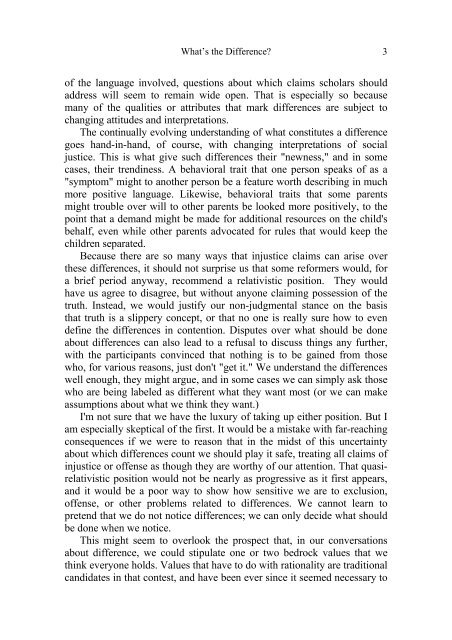978-1-4438-4527-4-sample
978-1-4438-4527-4-sample
978-1-4438-4527-4-sample
Create successful ePaper yourself
Turn your PDF publications into a flip-book with our unique Google optimized e-Paper software.
What’s the Difference?<br />
of the language involved, questions about which claims scholars should<br />
address will seem to remain wide open. That is especially so because<br />
many of the qualities or attributes that mark differences are subject to<br />
changing attitudes and interpretations.<br />
The continually evolving understanding of what constitutes a difference<br />
goes hand-in-hand, of course, with changing interpretations of social<br />
justice. This is what give such differences their "newness," and in some<br />
cases, their trendiness. A behavioral trait that one person speaks of as a<br />
"symptom" might to another person be a feature worth describing in much<br />
more positive language. Likewise, behavioral traits that some parents<br />
might trouble over will to other parents be looked more positively, to the<br />
point that a demand might be made for additional resources on the child's<br />
behalf, even while other parents advocated for rules that would keep the<br />
children separated.<br />
Because there are so many ways that injustice claims can arise over<br />
these differences, it should not surprise us that some reformers would, for<br />
a brief period anyway, recommend a relativistic position. They would<br />
have us agree to disagree, but without anyone claiming possession of the<br />
truth. Instead, we would justify our non-judgmental stance on the basis<br />
that truth is a slippery concept, or that no one is really sure how to even<br />
define the differences in contention. Disputes over what should be done<br />
about differences can also lead to a refusal to discuss things any further,<br />
with the participants convinced that nothing is to be gained from those<br />
who, for various reasons, just don't "get it." We understand the differences<br />
well enough, they might argue, and in some cases we can simply ask those<br />
who are being labeled as different what they want most (or we can make<br />
assumptions about what we think they want.)<br />
I'm not sure that we have the luxury of taking up either position. But I<br />
am especially skeptical of the first. It would be a mistake with far-reaching<br />
consequences if we were to reason that in the midst of this uncertainty<br />
about which differences count we should play it safe, treating all claims of<br />
injustice or offense as though they are worthy of our attention. That quasirelativistic<br />
position would not be nearly as progressive as it first appears,<br />
and it would be a poor way to show how sensitive we are to exclusion,<br />
offense, or other problems related to differences. We cannot learn to<br />
pretend that we do not notice differences; we can only decide what should<br />
be done when we notice.<br />
This might seem to overlook the prospect that, in our conversations<br />
about difference, we could stipulate one or two bedrock values that we<br />
think everyone holds. Values that have to do with rationality are traditional<br />
candidates in that contest, and have been ever since it seemed necessary to<br />
3


